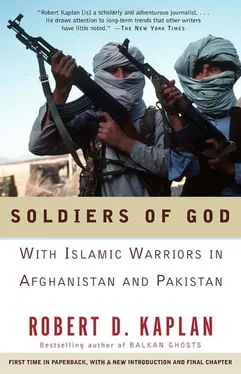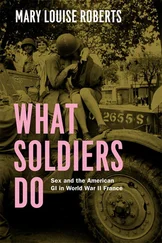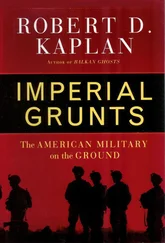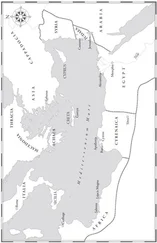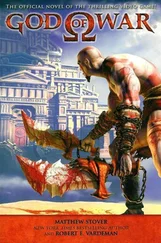It was an eight-hour trek to the crash site, seven hours of which were uphill, and he had to walk through a field of butterfly mines. “There was still a whiff of aviation fuel in the air, I remember,” Gunston told me. “The pilot had been there for several weeks and had turned black in the sun, though the snow had kept his body from decaying. Maggots were eating a hole in his face. I found his radio sigs and MiG-21 instruction book. But damn, the muj wouldn’t let me keep it.”
Gunston parted company with Massoud and arrived at Hekmatyar’s headquarters in Laghman over two months late, sick with hepatitis, and was put under the protection of a Commander Niazi. The next morning, the guerrillas and Gunston were caught in a rocket attack. Niazi was killed. “The program Niazi had arranged for me was now in grave doubt.”
To fill the time while new plans were made, the mujahidin took Gunston to photograph the largest Soviet air base in Afghanistan, at Baghram, about thirty-five miles north of Kabul and west of Hekmatyar’s base. Gunston took refuge in a deserted house near the main gate. When a squad of Soviet soldiers came out for a run in the direction of the house, Gunston took cover under a mulberry tree in a field close to the runway just as an Antonov-12 troop transport plane came thundering overhead. He began clicking away with his camera. Two Su-17 fighter jets followed close behind. “I started to get clobbered by a shower of stones from gibbering muj anxious to leave. But I was having too much fun,” Gunston said and grinned at me, blushing like a little boy, something he did often.
The shots taken at Baghram, along with the one of the dead pilot in the Panjshir, were published as an exclusive in the October 12-18, 1984, issue of the French news weekly L’Express. They were the first of what Gunston would later call his “pickies,” described by Rob Schultheis, in The Washington Post Magazine, as “close-ups of high-tech Soviet bloc equipment, unsuspecting Soviet officers and other ultra-sensitive subjects that must have caused the ulcers to burn at the Kremlin when they appeared in the world press.”
Gunston had expected to spend four weeks traveling with Hekmatyar’s men. But when he arrived back in Peshawar in September 1984, he had been inside Afghanistan for five months. The experience only whetted his appetite for more.
It was around this time that Gunston first met Abdul Haq. The two were introduced to each other in the lobby at Green’s Hotel. Haq listened silently as Gunston related his experiences, giving names, dates, and descriptions of various weapons and battle formations in the clipped, technical style of an army officer. He talked about how the Soviets used transport aircraft to provide battlefield illumination during night engagements. He went on to describe the actual configurations of the flares. Unlike the other journalists, Gunston was able to judge the fighting ability of the mujahidin as a military professional and was quite direct in his criticisms. “You have a very good memory,” Haq told him somewhat cryptically. “Get in touch with me if you want to make more trips inside.”
Gunston gave Haq color enlargements of all the pictures he had taken of the Soviet planes at Baghram. Every photograph that Haq put up in his war room was taken by Gunston. Like Gunston’s step-grandfather, Haq also had relatives who fought in the third British-Afghan war, in 1919 — but on the other side. The two ribbed each other with tales of their forebears. It was a natural friendship: both men were soldiers. And Gunston was a bit mad, free of Western hang-ups and complexes, and convinced of his own soldierly virtues —just like all Pathans.
Gunston was equally impressed with Haq. “The first time I was able to observe him inside was in May 1985, right after Ramadan had started. It was hot and dusty, and we were traveling constantly. But Haq kept the fast. He never ate or drank during the daylight hours, not even when walking, fighting, or meeting deputations of other commanders. The muj loathed him for this, because it meant that they had to keep the fast as well. But I suppose they respected him too, or at least feared him. Keeping the fast while on the move was something that not even Massoud did.”
In February 1988, Haq offered Gunston the ultimate trip inside. No Western journalist had been in Kabul with the mujahidin since 1985. In the mid-1980s, Gunston and several others had been able to penetrate the capital’s single security perimeter. Then the Soviets built two more security belts; there were now three checkpoints to pass through, each with barbed wire and minefields. Haq told Gunston not only that he could get him into Kabul but that he could also arrange meetings for him there with the regime’s army officers and KhAD agents who were secretly working for the mujahidin. “I know you won’t crack up and tell everything if you’re caught,” Haq told him. Gunston swore it was the first time in his life that he was humbled. “Anyway,” Haq added, “if you are caught, you can scream a lot, then you’ll be too busy to talk.”
It wasn’t until late April that Gunston got the go-ahead from Abdul Haq to cross the border. Haq gave Gunston a thirty-eight-year-old former Afghan army major, Syed Hamid, as an escort. In 1984, Hamid had defected from an army transport division in the southern city of Kandahar and joined Yunus Khalis’s Hizb-i-Islami, which is how Haq had met him. For the Khalis organization, Hamid was a rare kind of mujahid. He was a dandy who doused himself with Estelle perfume (not knowing it was for women), preferred a trimmed, Pakistani-style mustache to a beard, and was always dressed in a clean, tailor-fit shalwar kameez (the traditional Afghan trousers and shirt were loose and baggy). An educated Tajik from around Kabul, Hamid was also a bit of a wheeler-dealer. In a few short years since defecting from the Afghan army he had managed to procure himself a new Honda car and a partial ownership in an Islamabad video rental shop. He had the same qualities that help make a good intelligence agent, and that was why Haq recruited him. Later, Hamid merged his own network of Kabul friends into Haq’s much larger underground labyrinth in the capital.
Haq was the only commander in the whole Afghan resistance who was fighting an urban, Beirut-style war, and this required not only the backwoods mujahidin but city slickers like Hamid too. The fact that Hamid was a Tajik meant little to Haq. “I don’t give a shit,” Haq told me. “I’ll take a hardworking Tajik or Turkoman any day over a lazy, stupid Pa-than.” Haq’s chief accountant, who handled all the money for the Kabul underground, was also a Tajik.
Hamid and Gunston crossed the border at Terri-Mangal, a smuggler’s town one hundred miles west of the Khyber Pass that was perched at the edge of a salient of Pakistani territory, which brought the pair directly into Logar province, only a three-day trek from the Gardez—Kabul highway. Hamid bought himself a horse for 80,000 afghanis ($400). Gunston walked the whole way.
They reached the vicinity of the highway, patrolled by Soviet paratroopers, at the town of Kolangar, thirty-five miles south of Kabul, where Hamid’s Tajik friends from Jamiat gave him and Gunston a place to stay. Here they waited for Haq’s vehicle that was supposed to sneak them into Kabul. It was scheduled to arrive within a few days, but more than two weeks went by without any sign of it. They dispatched runners with messages for Haq. Meanwhile Hamid was up to three packs of cigarettes a day, and pushing four, trying to work out alternative schemes. One such scheme involved hiding inside the tank of an empty hijacked gasoline truck with Hamid’s cross-eyed brother at the wheel. “I had accompanied a few hare-brained muj missions in the past, but this promised to surpass them all,” Gunston later remarked to me. At the time Gunston pleaded with Hamid: “Don’t you realize that the fumes would kill us both if we sit inside the petrol tank? And anyway, you can’t even stop smoking!” According to Gunston, it was the last taunt, about his smoking habit, that decided Hamid against the idea.
Читать дальше
